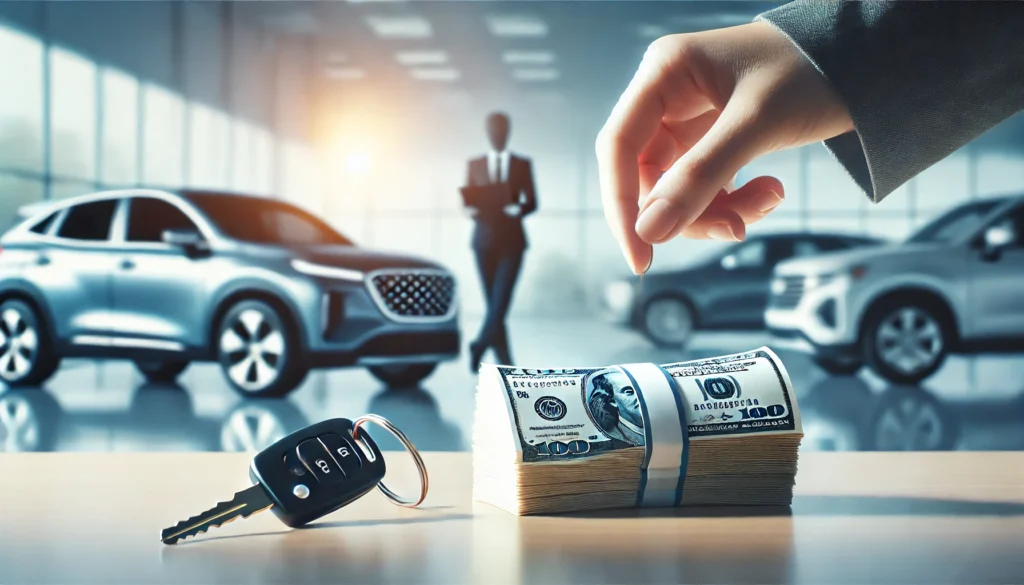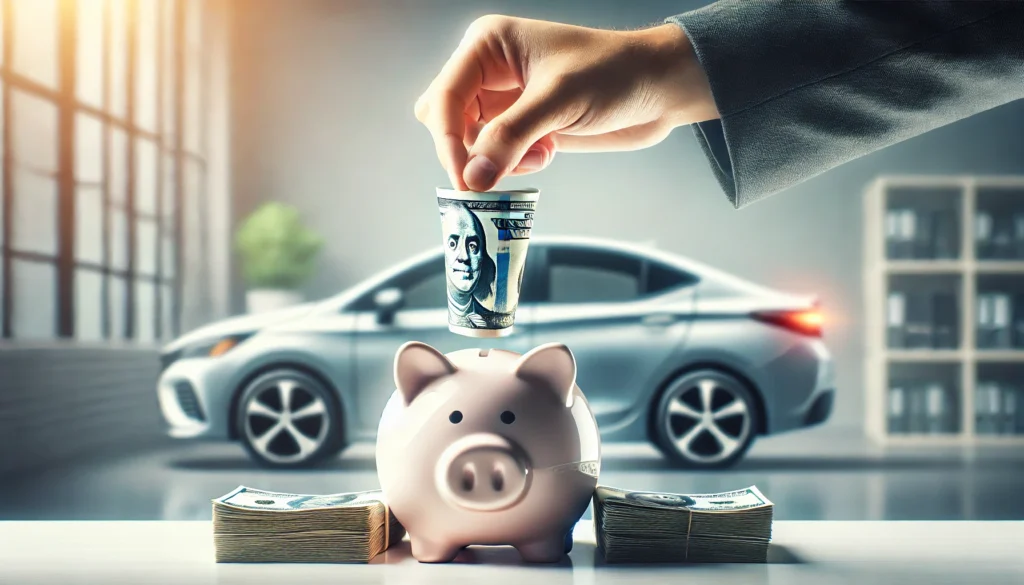The Power of Paying in Cash: How Cash Auto Loans Can Help You Save Big
Purchasing a car is a significant financial decision, and how you choose to pay for it can have long-term implications on your overall financial health. While financing options such as traditional auto loans or leasing may be the most common route, buying a vehicle with a cash auto loan offers a distinct set of advantages. By leveraging cash payments, buyers can avoid burdensome interest charges, reduce long-term debt, and secure better deals from sellers who prefer immediate payments.
Many consumers assume that financing a car is the only feasible option due to the high cost of vehicles. However, with strategic planning, saving for a cash purchase can be a realistic and financially beneficial alternative. Avoiding the cost of interest payments allows buyers to keep more money in their pockets, making vehicle ownership more affordable in the long run. Additionally, purchasing a car with cash provides a sense of financial security, eliminating the risk of repossession in case of financial hardship.
The goal of this guide is to explore the benefits of using cash car loans, how to strategically save for a vehicle purchase, and the best ways to negotiate favorable deals when paying in cash. By understanding the financial mechanics behind auto financing and cash payments, buyers can make informed decisions that align with their long-term financial goals.
You May Also Like: Smart Strategies for Buying a Car: How to Navigate Auto Loan Financial Options and Save Big
How Paying Cash for a Car Saves You Thousands in Interest Costs
One of the most compelling reasons to purchase a car with cash is the ability to avoid high-interest payments. Traditional auto loans often stretch over several years, accumulating significant interest costs that add to the total price of the vehicle. For example, financing a $30,000 vehicle with a five-year loan at a six percent interest rate could result in over $4,000 in interest payments alone. That means the buyer is ultimately paying far more than the sticker price of the car.
With a cash auto loan, the buyer eliminates these interest charges entirely. Instead of spreading payments over several years and incurring interest, they pay the full amount upfront and immediately own the vehicle outright. This reduces the overall cost of the purchase and ensures that every dollar spent goes toward the actual value of the car rather than financing fees.
Additionally, paying cash allows buyers to avoid loan origination fees, prepayment penalties, and mandatory full-coverage insurance requirements that often come with financed vehicles. These additional costs can add up quickly, making an auto loan more expensive than initially expected. By choosing cash car loans, buyers can sidestep these financial burdens and retain greater control over their money.
Furthermore, avoiding interest charges provides buyers with greater financial flexibility. Instead of committing to fixed monthly payments for several years, cash buyers can allocate their money toward other financial priorities such as investments, homeownership, or retirement savings. This flexibility allows for greater financial stability and the ability to respond to unexpected expenses without the burden of ongoing car payments.

Building a Strategic Savings Plan for a Cash Auto Loan
Saving for a cash auto loan requires careful planning and disciplined financial management. While paying cash for a vehicle may seem daunting, breaking the goal into manageable steps makes it achievable. The key is to create a structured savings plan that aligns with personal income, expenses, and financial goals.
The first step is setting a realistic target based on the type of car you want to purchase. Whether you are buying a new or used vehicle, researching market prices will help establish a clear savings goal. Once the target amount is determined, setting up a dedicated savings account specifically for your vehicle fund can help prevent the temptation to spend the money elsewhere.
Automating monthly contributions toward this account is one of the most effective ways to ensure consistent progress. By treating car savings as a fixed expense—similar to rent or utility bills—buyers can gradually build the necessary funds without significantly disrupting their lifestyle. Even small, consistent contributions add up over time, accelerating the ability to pay for a car in cash.
Reducing unnecessary expenses and reallocating those savings toward the vehicle fund can also speed up the process. For example, cutting back on dining out, subscription services, or impulse purchases can free up extra money that can be put toward the cash auto loan goal. Additionally, finding ways to increase income, such as taking on freelance work, selling unused items, or negotiating a salary increase, can help reach the target faster.
Another strategic approach is using windfalls such as tax refunds, work bonuses, or stimulus payments to boost savings. Applying these lump sums directly to the car savings fund can make a significant difference in reaching the goal more quickly. By combining consistent saving habits with smart financial decisions, buyers can position themselves to purchase a car with cash without financial strain.

How to Negotiate a Better Deal When Paying Cash for a Car
One of the most overlooked benefits of purchasing a car with cash is the ability to negotiate better pricing. Sellers, whether dealerships or private sellers, often prefer cash transactions because they eliminate financing complications and ensure immediate payment. This gives cash buyers leverage when negotiating the final price.
When approaching a dealership, it is crucial to research the fair market value of the desired vehicle in advance. Having a clear understanding of the car’s worth strengthens bargaining power and prevents overpaying. Websites that provide vehicle valuation estimates, such as Kelley Blue Book or Edmunds, can offer guidance on fair pricing.
Cash buyers should also be prepared to walk away if the price is not right. Dealerships are motivated to close deals quickly, and demonstrating a willingness to explore other options increases the likelihood of receiving a better offer. Patience is key when negotiating, as some dealerships may initially resist lowering the price but become more flexible if they believe they risk losing the sale.
Additionally, cash buyers should avoid disclosing their payment method too early in the negotiation process. Some dealerships make a higher profit from financed sales and may be less inclined to offer discounts to cash buyers upfront. Instead, negotiating the best possible price first and then revealing that the purchase will be made with cash car loans can prevent dealers from attempting to adjust the pricing structure in their favor.
Private sellers are often more flexible with pricing, as they do not have the same profit incentives as dealerships. When purchasing from an individual, offering immediate cash payment can be a compelling advantage, especially if the seller is looking to complete the transaction quickly. A reasonable but firm counteroffer can often result in significant savings.
By leveraging these negotiation strategies, buyers can maximize their purchasing power and secure the best possible deal on their next vehicle.

Frequently Asked Questions (FAQs) About Cash Auto Loans
1. What is a cash auto loan, and how does it work?
A cash auto loan is a financing option that allows buyers to purchase a vehicle with liquid funds, either by paying in full or using a short-term loan with favorable terms. Unlike traditional auto loans, which involve monthly payments and long-term interest, a cash car loan minimizes borrowing costs by reducing or eliminating interest payments. Buyers can secure funds through savings, personal loans, or short-term financing from banks or credit unions. This approach offers financial flexibility and helps buyers avoid accumulating unnecessary debt. With a cash auto loan, buyers gain full ownership of their vehicle immediately, avoiding the risks associated with long-term financing.
2. What are the advantages of buying a car with a cash auto loan?
A cash auto loan offers several advantages, including lower overall costs, better negotiating power, and financial freedom. By eliminating long-term interest payments, buyers can save thousands of dollars over the life of the loan. Additionally, dealerships and private sellers may offer discounts to cash car loan buyers due to the simplicity of the transaction. Paying in cash also eliminates monthly payments, freeing up income for other financial goals. Unlike traditional financing, a cash auto loan ensures the vehicle belongs to the buyer outright, removing the risk of repossession.
3. Is a cash auto loan a better option than traditional financing?
Choosing between a cash auto loan and traditional financing depends on a buyer’s financial situation and long-term goals. A cash car loan eliminates interest payments and provides immediate ownership, making it a cost-effective choice for those with sufficient savings. However, traditional financing allows buyers to spread payments over time, which may be beneficial for those who need to maintain liquidity. While financing may provide flexibility, it also results in higher overall costs due to interest. Buyers should assess their financial stability and use a cash auto loan if they want to minimize long-term debt.
4. How can I save for a cash auto loan?
Saving for a cash auto loan requires strategic planning and disciplined budgeting. Start by setting a realistic savings goal based on the type of vehicle you want to purchase. Allocate a portion of your monthly income toward a dedicated car fund and reduce discretionary expenses to accelerate savings. Consider investing in a high-yield savings account to grow your funds faster. If you need a vehicle sooner, look for short-term financing options with low interest rates to supplement your savings. The key to successfully using a cash car loan is ensuring that the purchase does not strain your overall financial health.
5. Can I negotiate a better price when using a cash auto loan?
Yes, buyers using a cash auto loan often have stronger negotiating power. Dealerships and private sellers prefer cash transactions because they eliminate the complexities of financing and ensure immediate payment. Buyers can leverage this advantage to negotiate lower prices, avoid unnecessary add-ons, and take advantage of cash incentives. When negotiating, emphasize that you are a cash buyer ready to complete the transaction immediately. While some dealerships may offer financing incentives, a cash car loan typically results in better overall savings by eliminating interest costs.
6. Do cash auto loans impact my credit score?
A cash auto loan does not directly impact your credit score unless you use a short-term loan that requires repayment reporting. Paying for a vehicle in full does not contribute to your credit history, as no lender reports payments to credit bureaus. However, if you secure a cash car loan through a financial institution and make timely payments, it can positively affect your credit score. On the other hand, traditional financing builds credit history over time but comes with interest costs. Buyers should weigh the benefits of avoiding debt against the potential impact on their credit score.
7. What are the risks of using a cash auto loan?
While a cash auto loan has many advantages, it also comes with potential risks. The primary risk is depleting savings, which can leave buyers financially vulnerable in emergencies. Using all available cash for a car purchase may also limit investment opportunities that could generate higher returns. Additionally, buyers may not qualify for financing promotions or cashback offers available through dealerships. To mitigate risks, buyers should maintain an emergency fund and carefully evaluate whether a cash car loan aligns with their overall financial goals. Ensuring that essential expenses and future savings are not compromised is key to making a smart financial decision.
8. What types of lenders offer cash auto loans?
Various financial institutions offer cash auto loans, including banks, credit unions, and online lenders. Credit unions often provide lower interest rates and flexible repayment terms for short-term financing. Online lenders may offer fast approval processes for buyers seeking a cash car loan with minimal paperwork. Some dealerships also provide in-house financing options that resemble cash auto loans, allowing buyers to secure short-term loans with competitive terms. Comparing loan offers from multiple sources ensures buyers secure the best possible deal. Before applying, check for any hidden fees or prepayment penalties that may affect the total loan cost.
9. Should I buy a new or used car with a cash auto loan?
The choice between a new and used vehicle depends on your budget and long-term financial plans. A cash auto loan is particularly beneficial for purchasing a used car, as it allows buyers to avoid high depreciation rates associated with new vehicles. Used cars generally cost less, making it easier to purchase outright or secure a cash car loan with a shorter repayment term. However, new cars come with warranties and lower maintenance costs, which may justify the higher price. Buyers should use a cash auto loan to purchase a reliable vehicle that meets their needs without overextending their budget.
10. Can I still get a cash auto loan if I have bad credit?
Yes, a cash auto loan is an excellent option for buyers with bad credit. Since cash car loans do not always require a credit check, they provide an opportunity to purchase a vehicle without worrying about loan approval. Buyers with poor credit can either save up and pay in full or seek short-term financing with manageable repayment terms. Many credit unions and specialized lenders offer cash auto loans tailored for individuals with low credit scores. To improve approval chances, consider making a larger down payment and selecting a vehicle within a reasonable budget.
Conclusion: Making Smart Financial Decisions with Cash Auto Loans
Choosing a cash auto loan over traditional financing provides numerous financial benefits, from eliminating costly interest payments to securing better deals with sellers. By paying in cash, buyers gain complete ownership of their vehicle without the burden of monthly loan payments, ultimately saving thousands of dollars in long-term costs.
Strategic planning is essential for making a cash purchase a reality. Establishing a dedicated savings plan, automating contributions, and cutting unnecessary expenses can help buyers accumulate the necessary funds efficiently. Additionally, using windfalls and extra income sources to boost savings accelerates the process, allowing for an earlier purchase.
When negotiating a vehicle purchase, cash buyers have a distinct advantage. By researching market prices, exercising patience, and strategically revealing their payment method, they can negotiate more favorable terms and avoid unnecessary fees. Dealerships and private sellers alike are often willing to provide better pricing for cash transactions, making it a valuable tool for securing a great deal.
Ultimately, the decision to use cash car loans is one that aligns with financial independence and smart money management. By eliminating debt, reducing financial stress, and maximizing savings, cash buyers set themselves up for long-term financial success. Whether purchasing a new or used car, taking a thoughtful, disciplined approach to saving and negotiating ensures that vehicle ownership remains an asset rather than a financial burden.
cash auto loans, car financing, save money on car purchase, cash car loans, auto loan savings, car buying tips, avoid car loan interest, cash vs financing, best way to buy a car, vehicle financing options, negotiate car price, used car purchase, auto loan alternatives, car payment strategies, short-term car loans, debt-free car buying, affordable car ownership, car loan cost comparison, financial freedom car buying, car buying budget planning
Further Reading:
Deciding Where to Get a Car Loan
How to Buy a Car with Cash: Everything You Need to Know
Paying Cash for a Car in 2025: Consider the Pros and Cons





